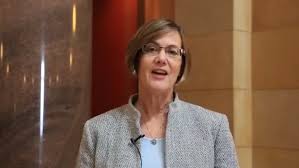DFL Lawmaker Bucks Nurses’ Union in Effort to Streamline Licensing
Judy Santiago just wants a level playing field with the Iowa, North Dakota, South Dakota and Wisconsin nurses who compete with her.
Minnesota has granted reciprocity to licensed nurses in neighboring states for ten years, allowing them to care for Minnesota patients, over the phone or in person, without requiring a Minnesota nursing license.
But Santiago still has to buy a separate license to practice in each state, costing the Burnsville nurse time and money.
“I know nurses who have 30 plus licenses in order to be able to work with patients telephonically,” Judy Santiago said. “That’s just ridiculous. It doesn’t make sense.”
What’s the hold up? Santiago puts the onus on the political clout of the Minnesota Nursing Association, a union representing about 20,000 of the more than 100,000 licensed Minnesota nurses.
“As an individual, I’m at a loss as to how something that’s this important, and affects so many people, how one opposition group, can really make a difference,” Santiago said.
MNA has long resisted attempts to enroll Minnesota in the national Nurse Licensure Compact, a consortium that enables nurses licensed in their home state to work in 25 member states, as well.
“The Compact is a direct threat to MNA as a professional association and sole collective bargaining agent for nurses in MN. No other large healthcare/labor states have allowed adoption of this Compact,” states a 2015 MNA fact sheet that’s being revised to reflect changes in the compact and proposed legislation.
The Catch-22 particularly affects nurses in border communities, telemedicine and the traveling nurse program.
“Nurses in Minnesota are at a disadvantage because they cannot practice in the surrounding states without buying a second, third or fourth license,” said Rep. Kim Norton, DFL-Rochester. “…We have a border state agreement, but it does not extend to our nurses and their state, just those coming into our state.”
In 2012, the Minnesota House and Senate passed a bipartisan bill paving the way for the state to join the compact, but the measure stalled in conference committee, following intensive lobbying by MNA.
Now union leaders frown on the latest effort to authorize compact membership, HF 220, authored by Rep. Norton. They claim compact membership could lower nursing, patient safety standards and job opportunities for Minnesotans.
“Some people might argue that this would create jobs for Minnesota nurses across the country,” MNA President Mary Turner testified at a House Subcommittee on Licensing hearing in February.
“I would rather see those well qualified graduates begin their practice right here. We’re currently graduating thousands of nurses, who are waiting months to find openings at hospitals. Instead, those positions will go to less qualified applicants from outside the state.”
Turner’s testimony led to criticism on social media that MNA “explicitly endorses protectionism against out-of-state nurses” and a #VeryUnconstitutional hashtag from the Institute for Justice.
But Mayo Clinic, the Minnesota Board of Nursing and other supporters argue health care providers need to keep up with advances in telemedicine.
“The patchwork of state-by-state licensing presents a costly and time consuming barrier to tele-health care delivery,” Diane Twedell, a Mayo Clinic Health System nurse, told legislators.
“Mayo Clinic sees the adoption of NLC (nurse compact) in Minnesota as affording our nurses with the opportunity to provide their expertise and skilled services to our patients in our border states and throughout the country more efficiently.”
Despite a truncated 2016 legislative session, MNA activists remain on alert over an issue with the potential to peel off more DFL lawmakers like Norton.
“The issue does seem to be more of an MNA as an organization issue, really, rather than a practical issue about the standard of care,” Norton said. “That really isn’t it for the nurses.”